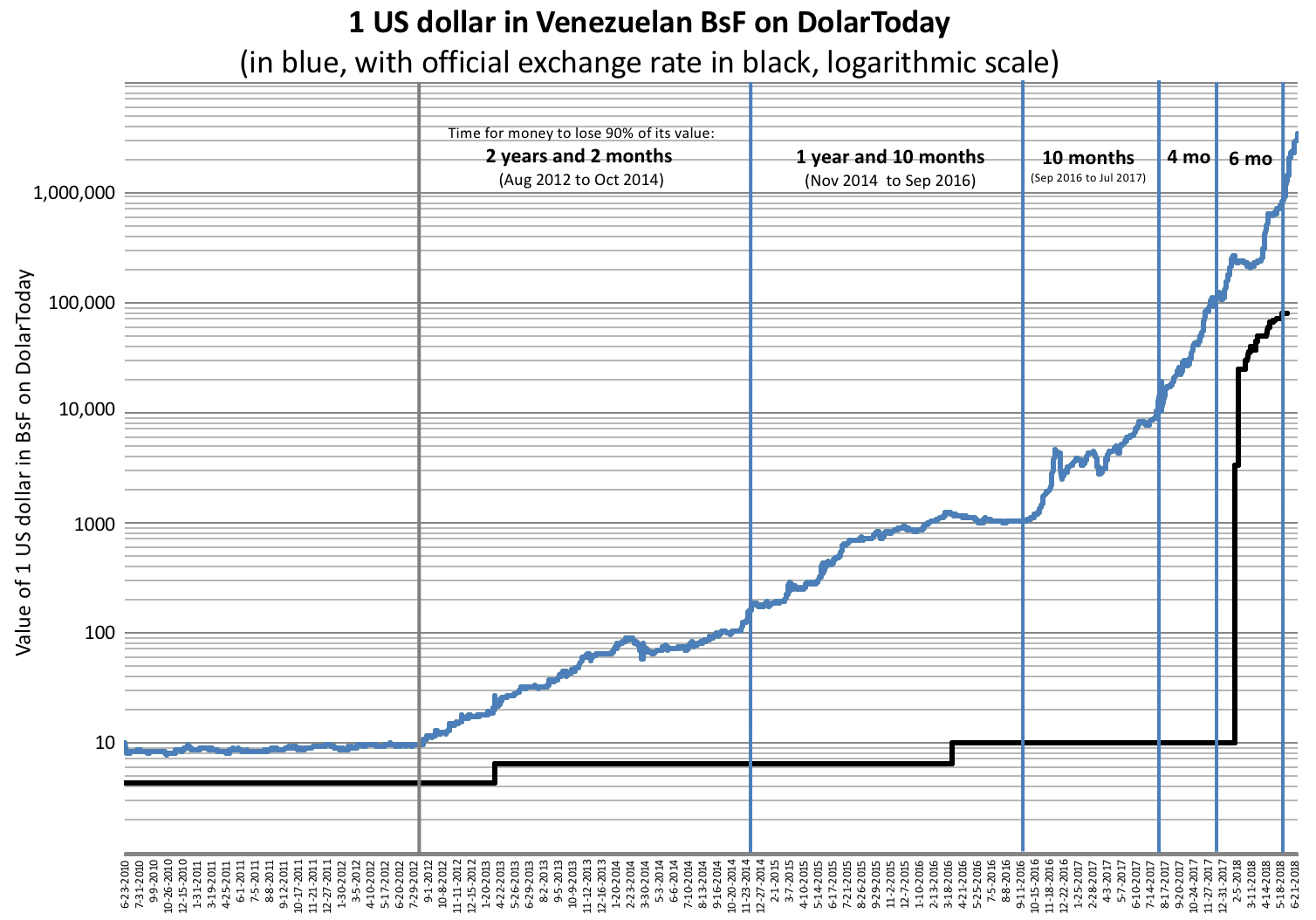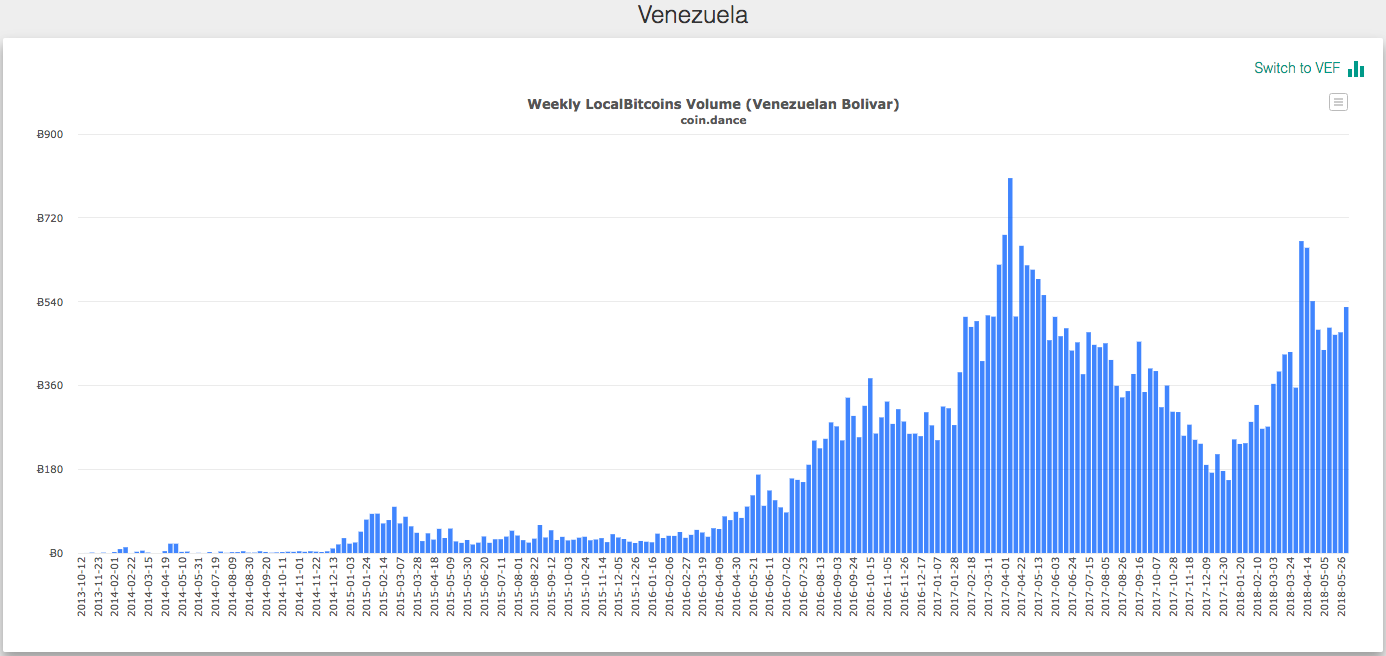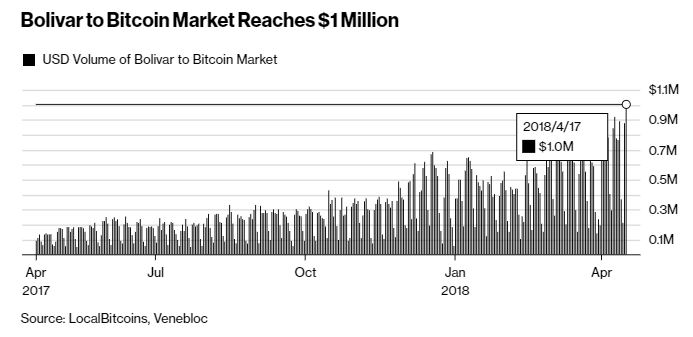
Blockchain and Roadblocks
While the rest of the world seems disillusioned by cryptocurrencies, all in the red after the frenzy of the last months of 2017, it seems that Bitcoin found an improbable adopter in the people of Venezuela. But first, let’s take a look at the troubled history of Venezuela’s fiat currency.
The current fiat currency of the Bolivarian Republic of Venezuela, the VEF Bolívar Fuerte (“Bolívar strong”) was introduced 1 of January 2008, after replacing the VEB Bolívar at a rate of 1 VEF = 1000 VEB due to inflation. The VEF is planned to suffer the same fate, as the Venezuelan regime plans to replace it with the VES Bolívar Soberano (“Sovereign Bolívar”) at a rate of 1 VES = 1000 VEB by 4 of August 2018 due to further inflation. Indeed, the VEF, despite being officially pegged to the USD at an official exchange rate, has been rendered virtually worthless by the hyperinflation it suffered in the last years on all other exchanges, including Venezuela’s internal black market.
In 2017 the strongest denomination of the VEF was 100,000 bolívares, worth $2,42 at the time of its release, which has since lost 98% of its value (trading by June 2018 at $0,05 by the unofficial exchange rate); as reported by Bloomberg some months ago, low denomination bolivares bills have been used as confetti during various sport events [1].
At the time of writing, 1 USD equals more than 1M VEF on the official market and more than three times that on the free black market exchange.

Such a rampant hyperinflation coupled with Venezuela’s economic collapse imposed a heavy toll on Venezuela’s population (the 75% of the population lost on average at least 8.7 kg due to food shortages [2] and wages collapse [3]), so it isn’t a surprise that millions of Venezuelans took to the streets to protest against the regime of Nicolás Maduro, in huge demonstrations that were often suppressed in blood [4] (the death toll reaching 200 persons, with systemic violations of basic human rights).
Other citizens of this troubled South-American country choose another way to show their dissent to their government and its disastrous planned economy: the volume of Bitcoin trading in Venezuela has been increasing steadily in the last years, hitting a volume of $1M per day in April this year. The low costs of electricity in this socialist country make it ideal for the energy-intensive process of Bitcoin mining, and many Venezuelans adopted this cryptocurrency for daily usage.


In fact, while the value of Bitcoin was plummetting everywhere else in the world following last year’s speculative market, this cryptocurrency became a matter of survival in Venezuela.
What is it used for? Many people exchange it online for stable foreign currency, such as Dollars and Euros, while others use it as a reserve of liquidity, a payment system, a way to access medicines and other products that became increasingly harder to find in Venezuela’s closed economy; this comes with a risk, of course: while the average policemen may not distinguish a miner from a simple computer, the regime is cracking down on Bitcoin mining operations (in 2017 a man named Joel Padron was arrested on charge of contraband and “energy theft”, and detained for more than 3 months in appalling conditions [5]).
While the state-controlled Venezuelan Television Corporation hammers the population with anti-Bitcoin propaganda, crypto coins are the only thing separating these miners from starvation or death from preventable diseases.
Even the regime itself launched its own “crypto”currency, the Petro, in what was probably an attempt to replenish its starved reserves of foreign currency. Predictably, the Petro (also backed by other illiberal countries such as China and Russia) was quickly considered a scam, with serious doubts cast on its validity [6].
Just to put things into perspective, one NANO (a cryptocurrency for peer-to-peer, no fee transactions) is worth in the US around $2,5. One NANO in Venezuela means:
“two kg of cornmeal, or one kg of meat, or thirteen eggs, or two kg of rice, or half of kg of dried milk, or one liter of cooking oil, or 100 pills of paracetamol or acetaminophen, or two or three pills of antibiotics depending on the dose, or 8 rolls of toilet paper, or one shampoo of 700 ml, or two deodorants” [7].
One NANO is more than the average Venezuelan makes in a month. It is inspiring to see how people living under dictatorships value economic freedom, something that we in the West often take for granted, or even despise; economic freedom equals freedom of the people, regardless of national boundaries, language, race, and religion. While Bitcoin mass adoption still seems quite far away in the free world, cryptocurrencies are already bringing freedom to people under the heel of oppression.
PS: if you wish to donate NANO to the people in need in Venezuela, here’s an address: xrb_1y1y3sp4r7kk5doqcgmyhh7nkbncbg1117b1m9s5h9etkfo7w148sddw39yg [8][9]
Sources:
[1]: www.bloomberg.com/news/articles/2018-03-02/venezuelans-are-paying-a-100-premium-for-cash
[2]: www.upi.com/Top_News/World-News/2017/02/19/Venezuela-75-of-population-lost-19-pounds-amid-crisis/2441487523377/
[3]: panampost.com/sabrina-martin/2018/01/04/new-monthly-minimum-wage-in-venezuela-barely-enough-to-buy-daily-cup-of-coffee/?cn-reloaded=1
[4]: www.cnn.com/2017/08/08/americas/venezuela-unrest/index.html
[5]: (from page 27): reason.com/issues/january-2017
[6]: www.bloomberg.com/news/articles/2018-04-03/crypto-rating-sites-are-already-calling-venezuela-s-petro-a-scam
[7]: cryptovest.com/news/interview-how-nano-community-and-brave-venezuelan-helped-save-people-from-starvation/
[8]: www.reddit.com/r/nanocurrency/comments/8v6dcy/got_my_first_05_nano_venezuelan_user/?st=jj97a6ns&sh=4d530240
[9]: www.reddit.com/r/nanocurrency/comments/8wfl2r/venezuelan_user_i_bought_102_kg_of_food_today/


